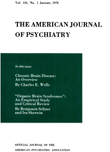Psychiatry with the Aborigines of West Malaysia
Abstract
The authors report on a year's experience with psychiatric patients from aborigine tribes in West Malaysia. Of the 20 cases seen, all but one were psychotic and 16 were also classified as schizophrenic. Withdrawal and running away were common symptom patterns. Only one patient came from a deep jungle area; the others were from fringe areas where sociocultural disruption was more evident. Because of a good preexisting medical service, these patients were easily managed in a hospital that emphasized their own culture. Follow-up in the jungle or villages by aborigine staff members and the use of long-acting injectable phenothiazines resulted in continued improvement of the patients.
Access content
To read the fulltext, please use one of the options below to sign in or purchase access.- Personal login
- Institutional Login
- Sign in via OpenAthens
- Register for access
-
Please login/register if you wish to pair your device and check access availability.
Not a subscriber?
PsychiatryOnline subscription options offer access to the DSM-5 library, books, journals, CME, and patient resources. This all-in-one virtual library provides psychiatrists and mental health professionals with key resources for diagnosis, treatment, research, and professional development.
Need more help? PsychiatryOnline Customer Service may be reached by emailing [email protected] or by calling 800-368-5777 (in the U.S.) or 703-907-7322 (outside the U.S.).



